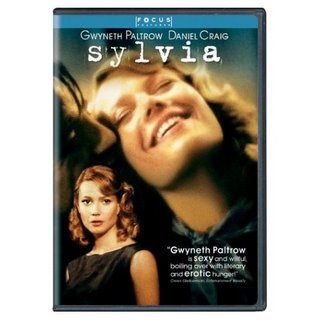
It's been a while since I did one of these, mainly because my Netflix queue is now clogged with TV shows I don't feel up to reviewing in full. But I did get the opportunity to see this, and it's an interesting little film, low-key but gradually powerful. SYLVIA has its flaws, but it tackles a more-difficult-than-usual biography subject with intelligence and respect. The story of Sylvia Plath is not, inherently, a cinematic one, but by focusing on her relationship with Ted Hughes, the filmmakers make it work.
The film opens in 1956, as Sylvia Plath (Gwyneth Paltrow), an American Fulbright scholar, is attending Cambridge. While scanning the Uni poetry mag for a review of her work, she comes across and is moved by a work by Edward Hughes. She meets Hughes (Daniel Craig) at a party and, despite his reputation for not taking steady girlfriends, the two become lovers and eventually marry, moving to the states. As Hughes wins awards and accolades for his poems, Sylvia struggles with trying to get her work published and starts to lose the will to work on them. Worse, she begins to suspect her husband of infidelity, first with college students, then with a fellow poet when they move back to England. The mental problems that led her to attempt suicide when younger begin to resurface, and things are made worse when she discovers her suspicions are real and throws Ted out. Amidst this, her literary status slowly rises, but she's still second to her husband, and her life looking after her two children doesn't get any better.
We all know that this story doesn't have a happy ending. Sadly, Plath may well be known more for her suicide than her poetry, and the focus of the film is more psychological than anything else. The perspective is, with a handful of exceptions, relentlessly first person, centering scenes and actions on Sylvia's perspective of them, dwelling on casual contacts between Ted and the women she suspects of loving him, the mundane details of her homemaking, and her own increasingly troubled visage. (The cinematography reminded me of Cronenberg's SPIDER, though that may just be a general post-War English grottiness.) It's disappointing, though, that the film seems to neglect Sylvia's creative and professional development; to be sure, writing is the hardest creative activity to effectively portray on film, but entire pieces of her career seem to be missing, particularly the point where she becomes a published poet and not just an aspiring one (we see a party for the publication of her first book, but not any indication of the writing of it.) Then again, the film implies and leaves us to infer a lot, and this seems to be deliberate. Sylvia's own poetry is described as being like seeing dark things just out of the corner of one's eye, rarely confronting them directly. Unfortunately I haven't actually read any of her work, so I can't say whether this is an accurate assessment, but it does justify the creative direction taken by the film to some extent.
Gwyneth Paltrow is one of the few actors I can name who, after winning an Academy Award, has turned in substantially better work. Her performance here is very intense, but not over-the-top; she very carefully pitches Sylvia's instability, and it seems natural throughout. Daniel Craig projects a certain intellectual ferocity to match, and keeps Hughes, if not sympathetic, understandable even as he cheats. The film is fairly neutral in assigning any blame for the tragedy; it was fashionable for a time to assume that Hughes had driven Plath to suicide, while Hughes attempted to give his side in "Birthday Letters", a book of poems about Sylvia published shortly before he died. The film does show at least two sides to the issue; Hughes' affair was inexcusable, and he didn't make all the right decisions in dealing with her, but of course she had genuine psychological problems, and the film conveys her strange longing for self-destruction as it bubbled beneath her consciousness.
Nuance like that is hard to get across in a biopic, and often results in a sense of timidity, but there's none of that here.
SYLVIA is the sort of film that starts slowly and shows some faults along the way, but in the end comes together quite beautifully. Made with more skill than is obvious at first glance, it delivers something that's asked of most biopics but that they can so rarely offer; a look at the subject's inner life. That alone makes it worth seeking out.
Written by John Brownlow
Directed by Christine Jeffs
Grade: A-
No comments:
Post a Comment